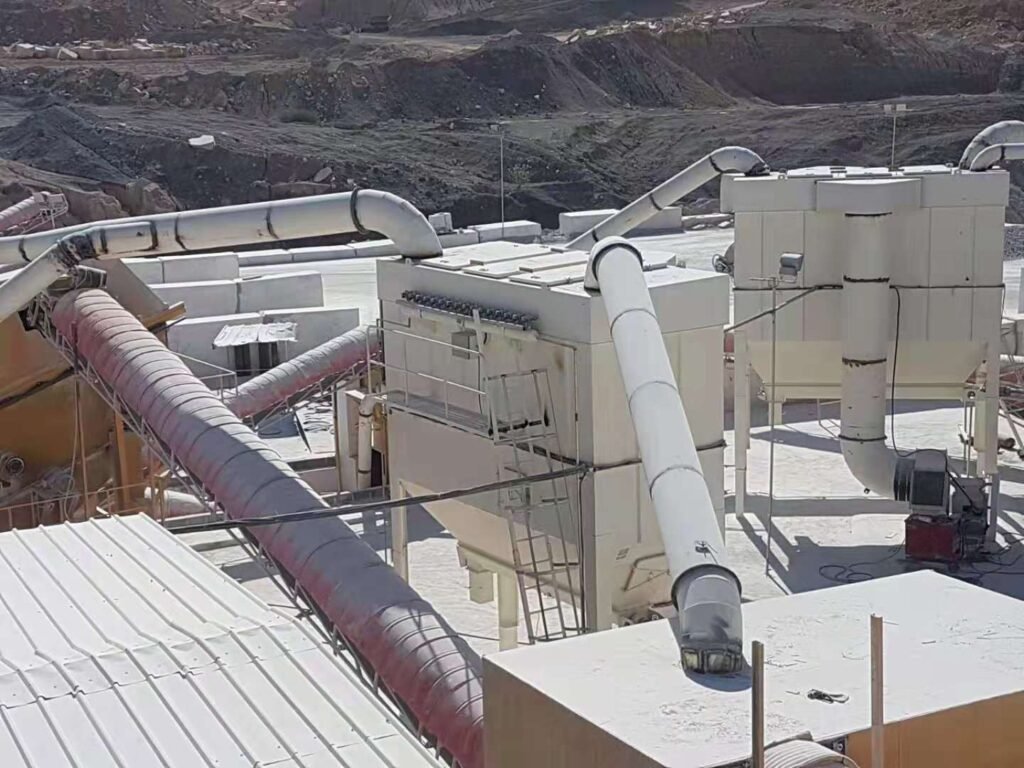Advantages of Using Bag Filters in Gravel Factories
Gravel factories, where large quantities of dust and particulate matter are produced during the extraction, processing, and transportation of materials, face significant challenges in maintaining air quality and complying with environmental regulations. One of the most effective solutions for controlling dust emissions in such environments is the use of bag filters (also known as fabric filters). These filtration systems provide numerous advantages that improve both operational efficiency and environmental compliance. Here’s a breakdown of the key benefits of using bag filters in gravel factories:

1. Superior Dust Control
Bag filters offer exceptional dust collection efficiency, typically capturing over 99% of airborne particles. In gravel production, where fine dust particles can be created during crushing, screening, and handling, these filters play a vital role in preventing the release of harmful dust into the atmosphere. By reducing particulate emissions, bag filters help gravel factories comply with stringent environmental standards, ensuring a cleaner, safer work environment.
2. Improved Air Quality
Excess dust in the air can create hazardous working conditions and contribute to respiratory problems for workers. Bag filters are designed to trap even the smallest dust particles, significantly improving air quality within the factory. This results in better health outcomes for employees and reduces the risk of dust-related illnesses, such as silicosis, which can be common in gravel and mining industries.
3. Enhanced Operational Efficiency
Bag filters require minimal maintenance and are highly efficient, reducing downtime during production. Once the filtration media is installed, the system operates continuously without requiring frequent changes, unlike other filtration methods that may need more regular interventions. This reliability ensures that gravel factories can maintain high operational uptime and reduce the costs associated with system failures or maintenance.
4. Long-Term Cost Savings
Although the initial investment in a bag filter system might be higher than some alternative dust control methods, the long-term operational savings are significant. Bag filters are energy-efficient, with low power consumption, which translates to reduced operating costs over time. Furthermore, their high dust collection efficiency minimizes the need for additional cleaning and maintenance, making them a cost-effective solution in the long run.
5. Compact and Versatile Design
Bag filters come in a range of sizes and configurations, allowing for flexibility in integration into different parts of the gravel factory. Whether it’s a small dust collection unit or a large, centralized filtration system, bag filters can be tailored to fit the specific requirements of the operation. This versatility ensures that they can be installed in various applications, from crushers to conveyor belts, without requiring significant redesigns of existing factory infrastructure.
6. Regulatory Compliance
With stringent environmental regulations in place, gravel factories must ensure that they minimize emissions and adhere to air quality standards. Bag filters are an effective solution for meeting these regulatory requirements. Many governments and environmental agencies mandate that industrial facilities implement dust control measures, and bag filters are widely recognized as a reliable technology to achieve compliance.
7. Energy Efficiency
Modern bag filter systems are designed to be energy efficient. They use advanced filtration technology that requires less energy compared to older or less efficient systems. The efficient operation of bag filters ensures that gravel factories can reduce their energy consumption while still maintaining high levels of dust removal.
8. Easy Disposal of Collected Dust
The dust collected by bag filters can be easily disposed of or repurposed. In gravel factories, the dust may even be recycled or used for other purposes, such as road base material. This not only helps in reducing waste but also allows for better management of by-products from the manufacturing process, contributing to the factory’s overall sustainability efforts.
9. Reduced Maintenance and Downtime
Bag filters are low-maintenance compared to many other dust collection systems. The filter bags are durable and can be replaced at regular intervals, reducing the need for frequent repairs or complicated maintenance. This characteristic leads to less downtime and more continuous production, contributing to higher factory productivity and lower operational disruptions.
10. Improved Worker Safety
In addition to reducing airborne dust, bag filters help create a cleaner, safer workplace by controlling the spread of dust and particulate matter. This significantly lowers the risks of accidents related to slippery floors or poor visibility caused by dust accumulation. A cleaner factory environment enhances overall safety and boosts worker morale.
Conclusion
Incorporating bag filters into a gravel factory’s dust collection system offers a range of advantages, from improving air quality and worker safety to ensuring regulatory compliance and boosting operational efficiency. These systems provide an effective, cost-efficient, and environmentally friendly solution to dust control, helping gravel factories meet the demands of modern industry while minimizing their environmental footprint. With their high dust collection efficiency, low maintenance requirements, and energy-saving features, bag filters are an investment that offers long-term benefits for both factory owners and employees.

